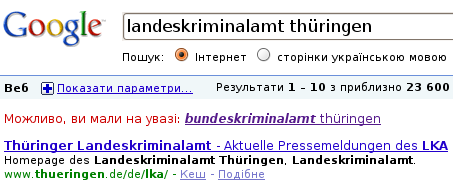Ich begab mich heute morgen auf die Suche nach der Internetadresse des LKA Thüringen. Google weiß ja immer alles besser und schlug mir vor besser das BKA Thüringen zu suchen: 

Ein Klick auf den Link brachte mir allerdings auch wieder nur die Homepage des LKA. Dabei dachte ich, ich hätte den geheimen Stützpunkt enttarnt und die Weltverschwörung aufgedeckt. 
Das LaTeX-Tutorial auf den Seiten wird immer wieder gern angeklickt und ist
ein häufiger Gegenstand der Suche bei Google. Jedoch sucht nicht jeder nach dem
Wort Tutorial
. Die Abweichungen sind enorm:
- tutorial
- turotial
- tuorial
- tuturial
- tutorium
- tutoriel
- turoial
- tuturial
- tutoriel
- tutorinal
- tutorials
- tutoriale
- tutoria
- tutorail
- turrial
- turial
- totorial
Falls ihr mal wieder die Orientierung verloren habt, so hilft euch folgende zsh-Funktion:
function whereami() {
wget -q “http://maps.google.com/maps/geo?output=csv&oe=utf-8&ll=$1,$2” -O - | cut -f3- -d,
}
Während des Verfassens des Blogeintrages befand ich mich also in, tipper, tipper, tipper whereami $(($RANDOM * 90/65535. )) $(($RANDOM * 180/65535. )), Amritsar, Punjab, India
. 
In Anlehnung an Tip #872 Reverse geocode with bash.
Der Crypto-Experte Nate Lawson hielt kürzlich bei Google einen Vortrag, den so genannten Tech Talk. Darin beschreibt er, was man bei der Implementierung von Kryptografie alles falsch machen kann. Wer von euch ein wenig Interesse an Krypto hat, sollte sich den unbedingt anhören:
via Google Tech Talk on common crypto flaws
Wer am 25. Juni nach Michael Jackson gesucht hat, wird überrascht gewesen sein. Google präsentierte statt einer Ergebnisseite unter Umständen eine Seite, die vor einem Virus oder ähnlichen warnt. Wie das? Offensichtlich suchten viele Leute nach Informationen über den Tod des Stars und belasteten mit den Anfragen das Netz insgesamt und eben auch Google. Die Firma bestätigte, dass die ersten Anfragen von deren System als Angriff gewertet wurden. Auch Yahoo! hatte einen enormen Ansturm zu bewältigen. Nach dem Blogeintrag gab es 16,4 Millionen Besucher, die die Nachrichtenseite aufriefen:
Yahoo! News set an all-time record in unique visitors with 16.4 million people, surpassing our previous record of 15.1 million visitors on election day. Four million people visited the site between 3-4pm Pacific time, setting an hourly record. We also recorded 175 million page views yesterday, our fourth highest after Inauguration Day, the day after the Inauguration, and Hurricane Ike.
Conversation between taxi driver (T) and passenger (P):
P: Do you know where we are?
T: Why?
P: Well, I want to know if we reached our final destination?
T: We’re Halfway,
Sir.
P: Only halfway? How long is the ride? What town are we in?
T: Uncertain
P: Hey, you’re the taxi driver. You should know the name of this
town!
T: Nameless
P: WTF? Tell me the name of this town!
T: Okay
P: TELL ME THE NAME!1!
T: Yell
P: Are you kidding me? Stop bullshitting me and tell me where I am
or ...
T: Panic
P: I’ll beat the panic out of you.
T: Okay. Ahhhhh. Goodnight
Original (with pictures) at Google Sightseeing.
Heute haben 38 Akademiker und Forscher einen offenen Brief (HTML-Version)an den CEO von Google, Eric Schmdit, geschrieben. So fordern auf sechs Seiten (plus zwei Seiten Fußnoten) die Standardnutzung von HTTPS und somit adäquate Sicherheit und den Schutz der Privatsphäre für die Nutzer.
Aus der Zusammenfassung:
Google already uses industry-standard Hypertext Transfer Protocol Secure (HTTPS) encryption technology to protect customers’ login information. However, encryption is not enabled by default to protect other information transmitted by users of Google Mail, Docs or Calendar. As a result, Google customers who compose email, documents, spreadsheets, presentations and calendar plans from a public connection (such as open wireless networks in coffee shops, libraries, and schools) face a very real risk of data theft and snooping, even by unsophisticated attackers. Tools to steal information are widely available on the Internet.
Google supports HTTPS encryption for the entire Gmail, Docs or Calendar session. However, this is disabled by default, and the configuration option controlling this security mechanism is not easy to discover. Few users know the risks they face when logging into Google’s Web applications from an unsecured network, and Google’s existing efforts are little help.
Support for HTTPS is built into every Web browser and is widely used in the finance and health industries to protect consumers’ sensitive information. Google even uses HTTPS encryption, enabled by default, to protect customers using Google Voice, Health, AdSense and Adwords. Google should now extend this degree of protection to users of Gmail, Docs and Calendar.
Rather than forcing its customers to “opt-in” to adequate security, Google should make security and privacy the default.
![]()

![]()